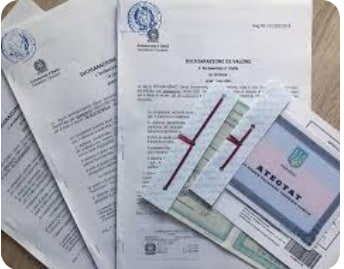Document Legalization: What Is It and When Is It Needed?
Document legalization is an important legal procedure that gives documents legal force outside their country of origin. This verification of documents by a lawyer service is crucial for many people planning to use their documents abroad. Let's take a closer look at what legalization is, when it's necessary, and how to properly carry it out.
What is Document Legalization?
Document legalization is a procedure for confirming the validity of a document in another country. In essence, it's an official certification that the document is genuine and has legal force. The legal analysis of documents service helps determine whether a specific document requires legalization.
Main objectives of legalization:
- Confirming the authenticity of the document.
- Recognizing the legal force of the document abroad.
- Preventing the use of forged documents.
- Simplifying international document circulation.
Legalization is an important step for those planning to study, work, or conduct business abroad. The legal analysis of a situation service will help determine if legalization is necessary in a specific case.
Types of Document Legalization
There are several types of document legalization, each with its own characteristics and areas of application. The legal opinion of a lawyer service will help determine what type of legalization is needed in your case.
Main types of legalization:
- Consular legalization
- Apostille
- Simplified legalization
Consular legalization is the most complex and time-consuming process, requiring document certification in several instances. Apostille is a simplified form of legalization used between countries that are parties to the Hague Convention. Simplified legalization is used between countries that have bilateral agreements on mutual recognition of documents.
Question
When is document legalization needed?
Answer
Document legalization is needed in many life situations when there's a need to use official papers outside the country of their issuance. This may be necessary when taking a job abroad, entering a foreign educational institution, concluding international agreements, registering a marriage with a foreigner, receiving inheritance in another country, etc. The legal advice service will help determine if legalization is needed in a specific case and how to properly carry it out.
Document Legalization Process
The document legalization process may vary depending on the type of legalization and the destination country. However, the general sequence of actions usually includes several stages. The written advice service will help understand all the nuances of the process.
Main stages of legalization:
Document preparation
Document translation (if necessary)
Notarization of copies and translations
Certification by the Ministry of Justice
Certification by the Ministry of Foreign Affairs
Legalization at the consulate of the destination country
It's important to remember that the legalization process can be quite lengthy and complex, so it's recommended to use the legal opinion service to get professional assistance.
Documents Requiring Legalization
Not all documents require legalization. The analysis of documents service will help determine which documents need to be legalized in your case.
Most often, legalization is required for:
- Educational documents (diplomas, certificates, credentials).
- Birth, marriage, divorce certificates.
- Criminal record certificates.
- Medical documents.
- Work books and employment certificates.
- Founding documents of legal entities.
- Powers of attorney and other legal documents.
The document analysis service will help determine if your documents meet the requirements for legalization.
Specific Features of Legalizing Different Types of Documents
Different types of documents may have their own specific features during legalization. The legal opinion of an attorney service will help understand the nuances of legalizing a specific document.
Specific features of legalization:
- Educational documents often require additional confirmation from the Ministry of Education.
- Medical documents may require certification by the Ministry of Health.
- Commercial documents sometimes require certification by the Chamber of Commerce and Industry.
It's important to consider these specific features to avoid delays or refusals in legalization. The lawyer online service will help take into account all the nuances and properly prepare the documents.
Question
What happens if we don't legalize the documents?
Answer
If you don't legalize documents when it's necessary, serious problems may arise when using them abroad. Non-legalized documents may not be recognized by official bodies of a foreign state, which can lead to refusal of employment, admission to studies, marriage registration, or other important procedures. This can result in significant financial costs, loss of time, and even legal problems. Therefore, it's important to timely use the advocate online service for consultation regarding the necessity of legalizing your documents.
Costs and Timeframes of Document Legalization
The costs and timeframes of document legalization can vary significantly depending on the type of legalization, the type of document, and the destination country. The legal opinion of an advocate service will help obtain up-to-date information about the costs and timeframes of legalization.
Factors affecting costs and timeframes:
- Type of legalization (consular, apostille, simplified).
- Type of document.
- Destination country.
- Urgency of legalization.
- Need for translation and notarization.
It's important to consider these factors when planning document legalization. The legal analysis service will help assess the overall cost and timeframes of the procedure.
Document Legalization in EU Countries
Document legalization in European Union countries has its own specific features. Most EU countries are parties to the Hague Convention, which simplifies the legalization process. The lawyer in Poland service will help understand the nuances of legalization for a specific EU country.
Specific features of legalization in the EU:
For most documents, apostille is sufficient
Some documents don't require legalization at all
There are bilateral agreements on simplified legalization
If you plan to use documents in EU countries, it's recommended to use the legal opinion from a lawyer service to obtain current information.
Legalization of Electronic Documents
With the development of digital technologies, the issue of legalizing electronic documents is becoming increasingly relevant. The written consultation service will help understand the specifics of legalizing digital documents.
Specific features of electronic document legalization:
- Need to confirm digital signature
- Specific requirements for document format and security
- Limited number of countries recognizing electronic documents
It's important to remember that not all countries are ready to accept legalized electronic documents. The lawyer in Warsaw service will help determine if a specific country accepts electronic documents.
Document legalization is an important legal procedure that allows the use of documents outside their country of origin. It may be necessary when taking a job abroad, studying at foreign educational institutions, concluding international agreements, and many other situations. The legalization process can be complex and time-consuming, so it's important to properly prepare documents and comply with all requirements. Neglecting legalization can lead to serious problems and financial losses. Therefore, it's recommended to seek professional help from lawyers and attorneys specializing in international law. The CONSULTANT legal marketplace offers a wide range of services, including lawyer and attorney services, which will help you properly legalize your documents and avoid potential problems in the future. Don't delay document legalization - contact professionals today! Consider using the online lawyer service for convenient and efficient assistance with your document legalization needs.



























